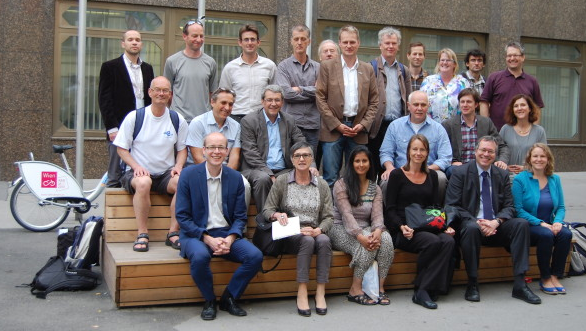National Cycling Officer network - meeting in Vienna
Introduction
Due to reasoning that most cycle trips are local, cycling is often considered to be, primarily, a local responsibility. However, closer research indicates that virtually all European countries that have a reasonably high level of cycling (> 5 % of modal split) have a national cycling strategy in place; whereas those which are lagging behind, don’t.
This being said, the most cycle-friendly country in Europe, the Netherlands, had published the ‘mother of all national cycle strategies’ early on, in 1990. In recent years, several regions and countries have also begun aspiring to reach this level, and have introduced national strategies, themselves: Ireland (2009), Scotland (2010), France (2011). Others are building on their experience with previous Master Plans and are in the process of adopting new strategies, including those in Germany and the Czech Republic. With the support of the European Commission, an initial benchmark of national cycling strategies had taken place in 2001 (National Cycling Policy Benchmarking Program NATCYP, 2001). Three years later, another analysis was done by European Conference of Ministers of Transport (ECMT), a predecessor of today’s International Transport Forum. The ECMT considered “national-level commitment […] important in setting the right legal, regulatory and financial framework so that successful implementation of cycling strategies can take place” (ECMT, National Strategies to Promote Cycling, 2004).

What is the aim of this network?
- Bringing experts and officials that work on national cycling policies together, to exchange best practices on national cycling strategies, including objectives, instruments, institutional processes and frameworks and involvement with civil society stakeholders, etc;
- Setting benchmarks of national level commitment, including human resources, financial investments, etc;
- Developing European standards on infrastructure design, data collection, bike theft, cycle-friendly traffic codes, etc.
The National Cycling Officer Network was informally established during the Velo-city 2011 conference in Seville, Spain. In June 2012, two workshops, hosted by ECF, with participants from Austria, Belgium, Czech Republic, Denmark, Finland, France, Germany, Hungary, the Netherlands, Norway and UK (Scotland) took place in Frankfurt and Vancouver. In 2013, a network meeting was organized before the Velo-city 2013 conference on June 10 in Vienna.
Do you want to become part of the network?
Contact: Fabian Küster, Policy Officer
+32 2 880 92 77
Network meeting in Vienna, June 10, 2013
More than 25 participants from 15 countries were present at the National Cycling Officer meeting. Robert Thaler, Head of Department from the Austrian National Ministry of Environment who kindly hosted this event, thanked ECF for putting this meeting together and invited to intensify cooperation within the PEP, a platform of the World Health Organisation (WHO) on Environment, Health and Transportation. Mr Thaler also stressed the importance of national leadership on cycling: “Every Euro we have invested in Austria from the national level triggered another 5-6 Euro’s from regional and local level”. He therefore called upon the European Commission also to develop a European Master Plan on Cycling.
The national cycling officers shortly presented the latest news on their national strategies. Among other, Peter Klučka from Slovakia happily announced that the Slovak government had very recently adopted the first national cycling strategy. The objective is to increase cycling to 10 % mode share in cities by 2020.
Newly appointed German National Cycling Coordinator, Birgitta Worringen, referred to the 2nd National Cycling Master Plan 2013 – 2020, and announced as next step the installation of a cross-ministerial working group to streamline policies horizontally across the different departments.
Dominique Lebrun from France explained that the main focus in the new French cycling strategy would be cycling to work. The government therefore looked into how the road code could be amended to cater better for cyclists’ needs, and to introduce fiscal incentives, following the Belgian example.
The meeting also included a briefing about ECF’s recent activities, EU cycling policies – such as the inclusion of EuroVelo in the TEN-T plan or the objective to double the modal share of cycling by 2020 – as well as the ECF barometer.
